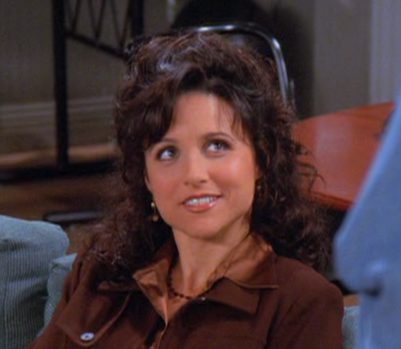Seinfeld’s Elaine – the trailblazing ‘anti-woman’
By Esyllt Sears
She’s fascinated with Greenland. She enjoys teasing animals, banlon, and seeing people running for their lives. She loves throwing garbage out the window, yet she’s extremely dainty.
[Jerry Seinfeld on Elaine, The Pilot, 1993]
Elaine Marie Benes, performed by Julia Louis-Dreyfus has been in my top five comedy characters for the last 21 years but has had the number one spot for the last three. I admire her, I laugh with her and at her, and for a year in my late twenties when I had unjustified confidence, I swear I was her.
I’ve only very recently dipped my toe into comedy writing and performing and I find myself constantly fighting against female stereotypes – mothers, sisters, daughters, tolerators of periods, users of straighteners, lovers of candlelit baths. So, I increasingly look to Julia Louis-Dreyfus and specifically her portrayal of Elaine Benes in Seinfeld to guide me.
As a character, I believe that she paved the way for other great female comedy characters – from the main characters in Sex & the City and Will & Grace to Fleabag in the series of the same name and Sharon in Catastrophe. And I would go as far as to say that apart from Mary Tyler Moore and Lucille Ball, no-one else has done more for women in comedy. But that’s my opinion.
So where do I start? She’s more one of the guys than the guys are. She’s non-maternal – I can recall at least two instances in the series where she recoils at seeing someone else’s baby and when she’s seen socialising with her female friends and they’re talking about children and living out of the city, she seems painfully out of place. She dates someone different in nearly every other episode and is unapologetic about it. One of the most shocking storylines to feature her, a woman, at the time was in The Contest (1992) when, on George being found pleasuring himself by his mother, the three male friends decide to enter a contest to see who can last the longest without doing so, and Elaine joins in. The fact that she’s the second to cave is even more shocking as the men had supposed it would be easier for a woman to abstain.
She is the anti-woman in the face of female stereotypes. So many female characters in comedies up until Seinfeld were of a type – in traditional roles, or as unrealistic caricatures – and a lot of the time, they were merely there as a way of setting up jokes for the men. But Elaine is funny. Funny in her own right.
She’s attractive but not in a glamorous, done-up way. I have several male friends who would do anything just to be in the same building as her. She’s incredibly physical, has shoved most of the male characters in the sitcom at one point or another, her hair is often dishevelled or she’ll walk into a scene picking her teeth and will talk with her mouth full. But she also displays stereotypical female emotions, not least when John F. Kennedy Jnr turns up at her gym. And this only endears you to her more.
Even when the subject of a storyline touches on a female-specific topic, the way Elaine approaches it is so out of line with what would’ve been expected of a woman. In one episode, she says the word “diaphragm” (as in the contraceptive) four times in 40 seconds, in another she admits to faking orgasms. One episode, entitled “The Sponge”, is dedicated entirely to Elaine trying to decide whether a man she’s seeing is sponge worthy.
Out of the four main characters, she seems to be the most career driven. Many of her storylines centre around her work or her ambition to secure a new job or impress her boss at the time. You don’t always necessarily agree with her or like her. She is as complicit in ruining the lives of other people as the men are, she can be selfish and judgemental, but I identify with that as a human being. We all have these traits that others wouldn’t like.
I personally don’t think Julia Louis-Dreyfus set out to be revolutionary, she just enjoys comedy and interpreted this character in the best way possible. It just so happens that she changed the face of comedy, certainly for women, as a result. And I hope one day I get to say thank you to her face to face.
Jerry Seinfeld once said in an interview that Julia (and therefore Elaine) was the key to the success of the show. Elaine wasn’t in the pilot and when she was introduced (following the network’s request for a stronger female presence), the part wasn’t a very big one. In fact, Julia complained that she wasn’t receiving big meaty comedy content and as a result that gradually started to change. The mandate Jerry Seinfeld and Larry David were given was to write her as a guy, but by following that rule, what they did is write a real woman.
If you have yet to discover Elaine and I could recommend just one episode that you must watch, then please go and find The Glasses (1993), today.
Esyllt Sears
@esylltmair

